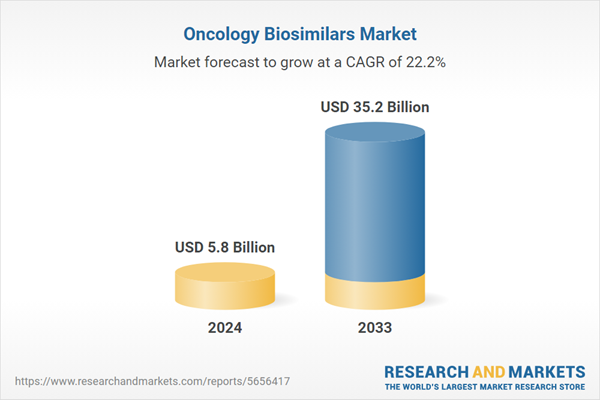Dublin, Sept. 12, 2025 (GLOBE NEWSWIRE) -- The "Oncology Biosimilars Market Report by Drug Type, and Region 2025-2033" has been added to ResearchAndMarkets.com's offering.
The global oncology biosimilars market is on a trajectory of robust expansion, with its value anticipated to soar from USD 5.8 billion in 2024 to USD 35.2 billion by 2033. This period will witness a compound annual growth rate (CAGR) of 21.15% from 2025 to 2033.
The impetus behind this growth stems from a rising geriatric population and environmental changes that have escalated cancer incidences worldwide, coupled with the increasingly high costs of cancer treatment burdening healthcare systems globally.
Oncology biosimilars present a cost-effective alternative to expensive branded biologics, mirroring their efficacy and safety. As a result, these biologics are gaining prominence as strategies for cost-containment within healthcare. Regulatory bodies, like the USFDA, actively promote biosimilars to bring down treatment costs while ensuring patient safety. As biosimilars gain traction, they not only enhance patient access to treatment but also stimulate industry competition, potentially driving down prices further.
The advancement of biosimilars is bolstered by several factors, including the impending patent expiries of pioneering biologics and increased R&D investment from biosimilar manufacturers. This competitive landscape fosters innovation and further supports competitive pricing, making cancer treatment more accessible.
Key Questions Answered in This Report:
- How has the global oncology biosimilars market performed so far and what are its future prospects?
- What was the impact of COVID-19 on this industry?
- What are the primary regional markets for oncology biosimilars?
- How is the market segmented by drug type?
- How is the market segmented by cancer type?
- How is the market segmented by distribution channel?
- What are the major factors driving and challenging the industry?
- Who are the industry's key players and what is the competitive landscape like?
Key Attributes:
| Report Attribute | Details |
| No. of Pages | 140 |
| Forecast Period | 2024 - 2033 |
| Estimated Market Value (USD) in 2024 | $5.8 Billion |
| Forecasted Market Value (USD) by 2033 | $35.2 Billion |
| Compound Annual Growth Rate | 22.2% |
| Regions Covered | Global |
Companies Featured
- Biocon Limited
- Celltrion Inc.
- Dr. Reddy's Laboratories Ltd.
- Intas Pharmaceuticals Ltd.
- STADA Arzneimittel AG
- Pfizer Inc.
- Apotex Inc.
- Teva Pharmaceutical Industries Ltd.
- Sandoz International GmbH
- BIOCAD Biotechnology Company
- Mylan N.V.
- F. Hoffmann-La Roche AG
Key Market Segmentation:
Breakup by Drug Type:
- Monoclonal Antibody
- Immunomodulators
- G-CSF
- Hematopoietic Agents
- Others
Breakup by Cancer Type:
- Lung Cancer
- Colorectal Cancer
- Cervical Cancer
- Breast Cancer
- Kidney Cancer
- Stomach Cancer
- Brain Cancer
- Others
Breakup by Distribution Channel:
- Hospital Pharmacies
- Online Pharmacies
- Retail Pharmacies
- Others
Breakup by Region:
- Europe
- Asia Pacific
- North America
- Middle East and Africa
- Latin America
For more information about this report visit https://www.researchandmarkets.com/r/p44e8d
About ResearchAndMarkets.com
ResearchAndMarkets.com is the world's leading source for international market research reports and market data. We provide you with the latest data on international and regional markets, key industries, the top companies, new products and the latest trends.
Attachment
